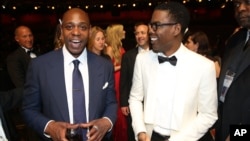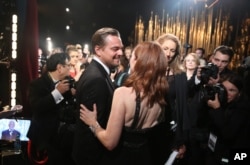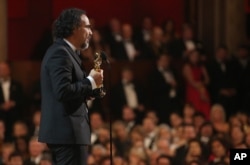The annual Academy Awards, or Oscars, were presented Sunday evening in Hollywood, and addressed a lack of diversity in the movie industry, touching on the issue through humor and impassioned pleas.
The Oscar presentation followed weeks of criticism that this year's nominees were overwhelmingly white.
The host of the ceremony at the Dolby Theater, comic Chris Rock, tackled the controversy in his opening monologue, and Cheryl Boone Isaacs, president of the Academy of Motion Picture Arts and Sciences, later said the industry should reflect the diversity of its audiences.
Oscar winners also spoke about the power of films to bring about change.
Leonardo DiCaprio, named best actor for the survival tale The Revenant, said the film addresses our relationship to the natural world. He added backstage that as he was filming the movie, he was simultaneously making a documentary about climate change, which he called “the most urgent threat facing our entire species.”
Alicia Vikander was named best supporting actress for The Danish Girl, in which she played the wife of a painter who underwent the world's first sex reassignment surgery. She said the film educated her to issues of gender, and she hoped it would “open up an even wider conversation.”
Spotlight, which won the Oscar for best picture, chronicled the efforts of a team of Boston reporters to uncover the sex abuse scandal in the Roman Catholic Church.
Producer Blye Pagon Faust said she and her fellow filmmakers learned through making the movie about “the importance of investigative journalism ... and the impact that it can have on a global scale.”
Documentary maker Sharmeen Obaid-Chinoy earned an Oscar for her short film A Girl in the River, about honor killings in Pakistan, and said she recently screened the film for Pakistan's prime minister.“Parliamentary and legislators were there” she told reporters backstage.
Obaid-Chinoy said the film examines manipulation of the law to protect those guilty of murder, a practice that she says Pakistan officials have promised to end.
Small changes, hope for more
Mexican filmmaker Alejandro Gonzalez Inarritu was named best director for the second consecutive year, winning this year for The Revenant. Last year, he won for Birdman.
Backstage, he questioned why people are so concerned with skin color, and said the issue has become “very polarized, very politicized.” He said “the color of the skin is completely irrelevant.”
Hollywood lacks diversity in many parts of the industry, said Margaret Sixel, who won the Oscar for film editing for the post-apocalyptic tale Mad Max: Fury Road.
The film won Oscars in six technical categories, the most of any movie. Sixel has encountered the prejudice that women cannot edit action movies, but says the Oscar-nominated women editors of Mad Max and Star Wars: The Force Awakens prove that wrong. “I think it will change,” she said.“I think it's already changing.”
Brie Larson was named best actress for the drama Room, in which she played a mother held captive with her young son. She said the film was transformative: “Making this movie was my own search for freedom and breaking free of my own personal boundaries.”
Larson added that she hopes it has the same effect on others.
Costume designer Jenny Beavan, who won the Oscar for Mad Max: Fury Road, says the film's depiction of desolation can alert us to be cautious about our future. “If we don't stop filling the ocean and land with toxic waste, I think that could all be horribly real,” she said.
Director Inarritu said that films “can teach us a lot” as they span a range of emotions from the “beautiful” to the “horrible.”















